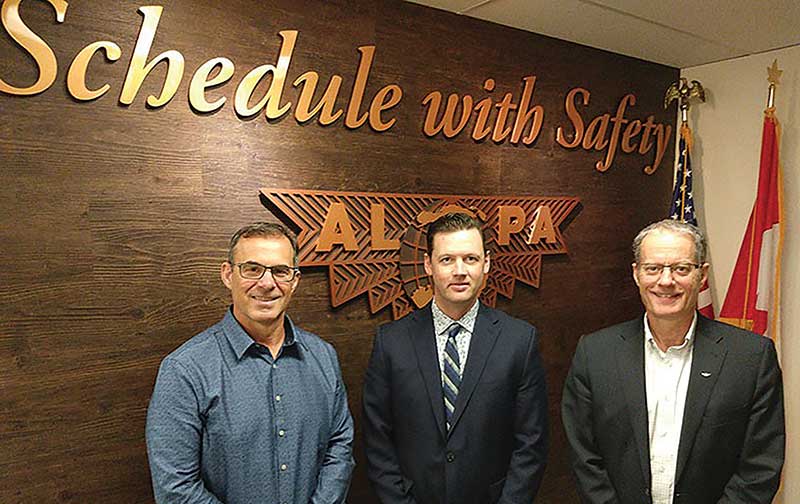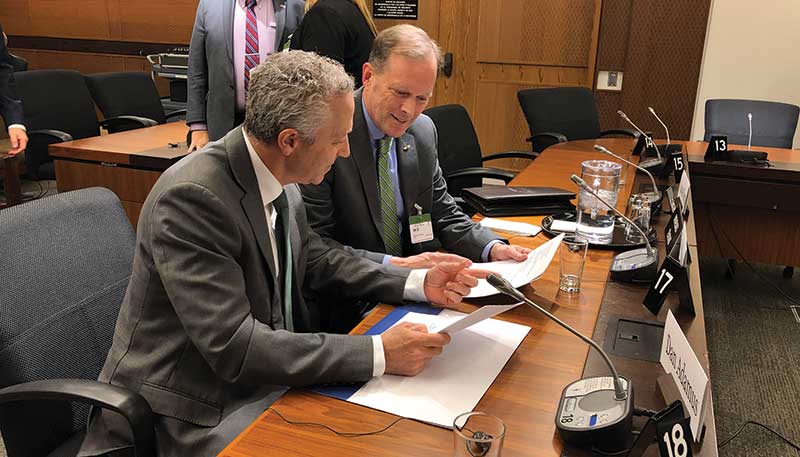ALPA Canada Update

From left, ALPA Canada Board officers Capts. Rod Lypchuk (Jazz Aviation), Tim Perry (WestJet), and Brian Shury (Jazz Aviation).
ALPA Canada’s New President Gets to Work
In early January, Capt. Tim Perry (WestJet), ALPA Canada’s new president, attended transition meetings and briefings and got acquainted with some of the key players in Ottawa, Ont., including both government and industry stakeholders.
Perry has also begun reaching out directly to some of the Association’s Canadian members and has noted he’s looking forward to working alongside Capt. Brian Shury (Jazz Aviation), ALPA Canada vice president, and Capt. Rod Lypchuk (Jazz Aviation), ALPA Canada vice president–administration/finance, along with the master executive council representatives from the Canada Board to move Canadian pilots’ interests forward.
During recent internal meetings, Perry acknowledged that he plans to address several issues, including mandatory drug and alcohol testing, surveillance on the flight deck, and other incoming and potential regulations, through increased lobbying efforts. “I want to bring a louder, clearer voice to Ottawa, and a key part of my plan is to combine all of our voices by coordinating and making it easier to become involved,” Perry said.
Transport Canada Drone Regulations Don’t Go Far Enough
The Canadian government’s recent announcement of regulations for small remotely piloted aircraft systems (RPAS), commonly referred to as drones, is a good first step, but the regulations fall short of adequately protecting passengers, cargo, and crews on commercial flights in Canada, according to ALPA.
“Our outstanding issues with the proposed regulations have not been adequately addressed in the new regulations,” said Capt. Tim Perry (WestJet), ALPA Canada president. “While we remain in favour of proceeding with the regulations to immediately improve our regulatory framework, this fast-growing sector of aviation still needs better regulations to ensure the safety of our skies. To achieve this, our outstanding issues should be addressed as soon as possible during the implementation phase.”
ALPA participated in the development of the regulations, providing extensive feedback to various proposals throughout the process. Despite these efforts, several instances—a collision near Québec City, Qué, and the recent shutdowns of England’s Gatwick and Heathrow Airports due to drone sightings—illustrate the need for more robust regulations.
The following are ALPA’s top-five outstanding issues with the regulatory framework:
- Permitting up to five RPASs for one pilot is unacceptable. This was considered and rejected by other regulators.
- Permitting RPAS flights as close as three nautical miles from airports, and closer in some circumstances, is an unacceptable risk. The limit should be five nautical miles from all places where commercial aircraft take off and land.
- Transport Canada should regulate all drone operations and not delegate their oversight responsibilities. Members of the Model Aeronautics Association of Canada will be exempt from the regulations for recreational flights. ALPA is concerned about the increasing complexity of this sector and the ability of a third party to adequately self-regulate this large and growing sector.
- Airworthiness oversight of the RPAS aircraft involved hasn’t been given the attention it should receive.
- Night operations are permitted with only sufficient illumination to permit the operator of the RPAS to see the RPAS aircraft but not necessarily for pilots of other aircraft to see it.
“ALPA will continue to work with Transport Canada and RPAS stakeholders during the implementation phase to maximize safety for those who travel by and work in the air,” Perry added.
Sharing Perspectives on How to Retain Flight Instructors in Canada
Capt. Dan Adamus (Jazz Aviation), then ALPA Canada president, visited Parliament Hill in early December 2018 to assist the Standing Committee on Transport, Infrastructure, and Communities on its study of the challenges flight schools face to provide trained pilots to the aviation industry. His message to committee members was simple: If you pay them, they will come.
Being a flight instructor is considered an entry-level job—with little incentive to remain teaching any longer than necessary. Often, flight instructors leave at the first opportunity to establish their position on a seniority list with an airline.
A solution? The aviation industry should align itself with other industries and recognize years of service and experience for pay purposes. By doing so, flight instructor time would count toward their pay level if, or when, they decide to go to an airline. Likewise, a pilot late in his or her career may wish to finish off the last few years as a flight instructor. Adamus acknowledged that this is a significant departure from the current practice and would require buy in from all stakeholders, and he told the committee it would help create a more stable and predictable career path for pilots and maintain Canada as a world leader in aviation.

During his visit to Parliament Hill to assist the Standing Committee on Transport, Infrastructure, and Communities, Capt. Dan Adamus, then ALPA Canada president, seated left, confers with Mark Laurence, the national chair of the Canadian Federal Pilots Association.
ALPA Canada Board Convenes Final Meeting of 2018
The ALPA Canada Board held its final meeting of 2018 in late November. Kicking things off, representatives from Sky Regional, ALPA’s newest pilot group, were welcomed and introduced. The group also engaged in thoughtful discussions on both new and ongoing issues for Canadian airline pilots.
A detailed briefing on flight- and duty-time regulations was provided by the Canada Board officers along with Capt. Percy Wadia (Jazz Aviation, Ret.), who has been assisting ALPA on this issue.
Other topics that garnered attention were a “Made in Canada” bargaining conference focusing on a new approach to bargaining and negotiations training, as well as efforts to grow ALPA’s Education Committee in Canada.
The status of the ALPA/Air Canada Pilots Association merger was also discussed, and the Canada Board unanimously passed a related resolution.
Updates on the merger between Canadian North and First Air were provided, and both pilot groups look forward to moving the process forward when the companies are ready to engage.
The meeting concluded with farewell remarks from Capt. Dan Adamus (Jazz Aviation), who was chairing his final Canada Board meeting as president.

